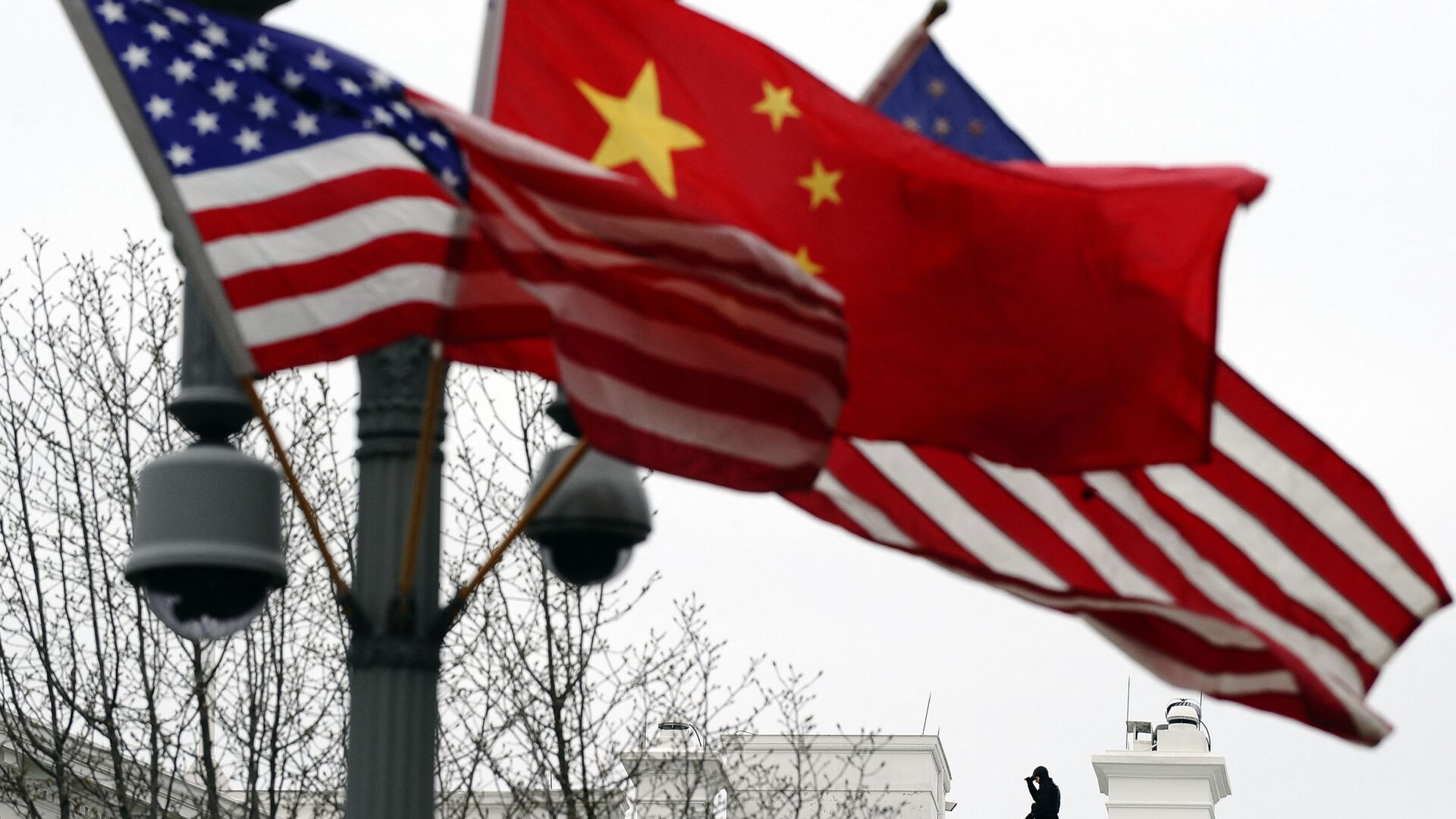https://sputnikglobe.com/20230131/whats-new-in-us-latest-rhetoric-on-china-1106852459.html
What’s New in US’ Latest Rhetoric on China?
What’s New in US’ Latest Rhetoric on China?
Sputnik International
Engagement between US and China actually came to a standstill following the August 2022 visit by then-US House Speaker Nancy Pelosi to Taiwan despite protests by Beijing.
2023-01-31T13:59+0000
2023-01-31T13:59+0000
2023-06-19T12:45+0000
china
us
tensions
escalation
strategy
nancy pelosi
sputnik explains
taiwan
https://cdn1.img.sputnikglobe.com/img/07e5/07/0f/1083388892_0:203:2919:1845_1920x0_80_0_0_cbbd453e25eb1456353dff85d95c7af0.jpg
Recent days have seen US officials express fresh unfriendly rhetoric (sometimes stern) toward China, in a sign of escalation of political and economic tensions between the two countries. Let’s take a closer look at what exactly they said.US Wins Japan, Netherlands' Support to Hit China's Chip IndustryA US media outlet has cited unnamed sources as saying that Washington has managed to convince Tokyo and Amsterdam to join the United States in expanding a ban on exports of chip-making technology to China.The sources claimed that several key companies in Japan and the Netherlands, as part of the agreement, will implement some US export control measures the White House adopted last fall. The insiders argued that the deal would restrict China's access to semiconductor technology from Dutch firm ASML and Japanese firms Nikon Corp and Tokyo Electron Ltd. ASML is the world’s only producer of machines that use extreme ultraviolet lithography to make advanced semiconductor chips.White House National Security Council spokesman John Kirby for his part told reporters that Dutch and Japanese officials met US National Security Advisor Jake Sullivan in Washington to discuss the issue.He added that the Biden administration is “grateful that they were able to come to DC and to have these talks.” Kirby declined to say whether there was a deal on tighter export controls on semiconductor technology.In October 2022, Washington expanded controls on the export of US semiconductor technology going to China to restrict Beijing's ability to make certain high-end microchips that the White House claims are used by Beijing in military applications, allegations that Chinese authorities have repeatedly rejected. Beijing took the matter to the World Trade Organization (WTO), filing a lawsuit challenging the US export controls. US Exports to Huawei HaltedIn a separate development, a UK newspaper reported that Washington had stopped issuing licenses to US companies to export to Huawei, as the US administration is getting closer to imposing a total ban on American technology sale to the Chinese telecom giant.The newspaper claimed that the decision comes as Washington moves towards a total ban on the sale of US technology to the Chinese telecom equipment giant.Washington’s move comes amid stabilization of Huawei’s operations in the face of the US clampdown on the company. The firm’s rotating chair Eric Xu said in December that 2023 would be the first year in which Huawei would return to “business as usual.” According to the company, its 2022 revenues were flat at $94bn after a significant decline in 2021.Washington's ongoing crackdown on Huawei kicked off back in May 2019, when the US Department of Commerce banned Internet providers from using the company's products and American tech firms from selling technologies to the Chinese telecom titan without obtaining a special license first.The White House argues that the company is collaborating with the Chinese government to allow it to spy on those who use the tech firm’s equipment, allegations that have been rejected by both Beijing and Huawei. In 2020, the US barred manufacturers from using American technology to produce chips for Huawei, in a move that came amid the Trump administration's efforts to pressure foreign countries not to purchase Huawei's 5G equipment.'Very High' Odds of US War With China?Michael McCaul, the new chairman of the Foreign Affairs Committee in the US House of Representatives, told an American media outlet that the odds of an armed conflict between Washington and Beijing over Taiwan “are very high” after a US general suggested in a leaked memo that such a conflict would purportedly happen in the next few years.He claimed that if China fails to take control of Taiwan without bloodshed, then “they are going to look at a military invasion in my judgment. We have to be prepared for this”.The memo McCaul referred to was earlier issued by US Air Force Mobility Command chief General Mike Minihan and is titled “February 2023 Orders in Preparation for the Next Fight.” The document is addressed to US commanders and officers, outlining an operational game plan for the forces under Minihan’s command and other members of the US military in the coming months.The White House has not commented on the issue yet, while a Pentagon official said that Minihan’s comments were “not representative of the department’s view on China.”The US wrapped up formal relations with Taiwan in 1979, as stipulated in the second communiqué and the US Congress-ratified Taiwan Relations Act that came into effect that year.Since then, the US has maintained a policy of “strategic ambiguity” of neither encouraging Taiwanese independence nor its reconciliation with Beijing. Under the Taiwan Relations Act, the US continues to provide the island with arms to help Taipei to defend itself in case of any military event. This is vehemently opposed by Beijing, which sees Taiwan as an integral part of China.The situation around Taiwan escalated after US House Speaker Nancy Pelosi visited the island in early August 2022. China condemned the trip, dubbing it a gesture of support for separatism, and launched large-scale military exercises in the vicinity of the island in retaliation.Earlier last year, the White House had to reiterate several times that the US’ “strategic ambiguity” policy had not changed following President Joe Biden’s apparent hints that there would be a military response from Washington if Beijing attempts to use force against Taiwan.'Most Consequential Geopolitical Challenge'US officials’ latest statements on China come as Beijing was described as America’s top threat in Washington’s new National Defense Strategy that was unveiled in October 2022.National Security Advisor Jake Sullivan told reporters at the time that the strategy recognizes that “the PRC [People’s Republic of China] presents America’s most consequential geopolitical challenge.”On the other hand, the strategy notes that “It is possible for the United States and the PRC to coexist peacefully, and share in and contribute to human progress together.”
https://sputnikglobe.com/20220901/china-chip-restrictions-will-backfire-cause-severe-economic-pain-for-us-itself-observers-say-1100282954.html
https://sputnikglobe.com/20221203/us-judge-dismisses-indictment-against-huawei-cfo-meng-1104989881.html
https://sputnikglobe.com/20230110/think-tank-simulation-predicts-taiwan-could-defeat-china-with-us-japan-aid-in-invasion-scenario-1106184632.html
china
taiwan
Sputnik International
feedback@sputniknews.com
+74956456601
MIA „Rossiya Segodnya“
2023
Oleg Burunov
https://cdn1.img.sputnikglobe.com/img/07e4/09/0b/1080424846_0:0:2048:2048_100x100_80_0_0_3d7b461f8a98586fa3fe739930816aea.jpg
Oleg Burunov
https://cdn1.img.sputnikglobe.com/img/07e4/09/0b/1080424846_0:0:2048:2048_100x100_80_0_0_3d7b461f8a98586fa3fe739930816aea.jpg
News
en_EN
Sputnik International
feedback@sputniknews.com
+74956456601
MIA „Rossiya Segodnya“
Sputnik International
feedback@sputniknews.com
+74956456601
MIA „Rossiya Segodnya“
Oleg Burunov
https://cdn1.img.sputnikglobe.com/img/07e4/09/0b/1080424846_0:0:2048:2048_100x100_80_0_0_3d7b461f8a98586fa3fe739930816aea.jpg
us-china relations, us crackdown on huawei, escalation of tensions between beijing and washington, us-chinese tensions over taiwan, a us general's prediction of washington's war with beijing, nancy pelosi's visit to taiwan
us-china relations, us crackdown on huawei, escalation of tensions between beijing and washington, us-chinese tensions over taiwan, a us general's prediction of washington's war with beijing, nancy pelosi's visit to taiwan
What’s New in US’ Latest Rhetoric on China?
13:59 GMT 31.01.2023 (Updated: 12:45 GMT 19.06.2023) With the US and China still maintaining diplomatic contacts, engagement between the two countries came to a standstill following the August 2022 visit by then-US House Speaker Nancy Pelosi to Taiwan, despite protests by Beijing.
Recent days have seen US officials express fresh unfriendly rhetoric (sometimes stern) toward China, in a sign of escalation of political and economic tensions between the two countries. Let’s take a closer look at what exactly they said.
US Wins Japan, Netherlands' Support to Hit China's Chip Industry
A US media outlet has cited unnamed sources as saying that Washington has managed to convince Tokyo and Amsterdam to join the United States in expanding a ban on exports of chip-making technology to China.
The sources claimed that several key companies in Japan and the Netherlands, as part of the agreement, will implement some US export control measures the White House adopted last fall. The insiders argued that the deal would restrict
China's access to semiconductor technology from Dutch firm ASML and Japanese firms Nikon Corp and Tokyo Electron Ltd. ASML is the world’s only producer of machines that use extreme ultraviolet lithography to make advanced semiconductor chips.
White House National Security Council spokesman John Kirby for his part told reporters that Dutch and Japanese officials met US National Security Advisor Jake Sullivan in Washington to discuss the issue.

1 September 2022, 17:32 GMT
“As you might expect, they are talking about a range of issues that are important to all three of us, and certainly the safety and security of emerging technologies is going to be on that agenda,” Kirby said.
He added that the Biden administration is “grateful that they were able to come to DC and to have these talks.” Kirby declined to say whether there was a deal on tighter export controls on semiconductor technology.
In October 2022, Washington expanded controls on the export of US semiconductor technology going to China to restrict Beijing's ability to make certain high-end microchips that the White House claims are used by Beijing in military applications, allegations that Chinese authorities have repeatedly rejected.
Beijing took the matter to the World Trade Organization (WTO), filing a lawsuit challenging the US export controls.
US Exports to Huawei Halted
In a separate development, a UK newspaper reported that Washington had stopped issuing licenses to US companies to export to Huawei, as the US administration is getting closer to imposing a total ban on American technology sale to the Chinese telecom giant.
The newspaper claimed that the decision comes as Washington moves towards a total ban on the sale of US technology to the Chinese telecom equipment giant.
The US Commerce Department declined to comment on the matter, only saying that the agency, along with other government departments, would “continually assess” its “policies and regulations and communicate regularly with external stakeholders”.
Washington’s move comes amid stabilization of Huawei’s operations in the face of the US clampdown on the company. The firm’s rotating chair Eric Xu said in December that 2023 would be the first year in which Huawei would return to “business as usual.” According to the company, its 2022 revenues were flat at $94bn after a significant decline in 2021.

3 December 2022, 02:20 GMT
Washington's ongoing crackdown on Huawei kicked off back in May 2019, when the US Department of Commerce banned Internet providers from using the company's products and American tech firms from selling technologies to the Chinese telecom titan without obtaining a special license first.
The White House argues that the company is collaborating with the Chinese government to allow it to spy on those who use the tech firm’s equipment, allegations that have been rejected by both Beijing and Huawei. In 2020, the US barred manufacturers from using American technology to produce chips for Huawei, in a move that came amid the Trump administration's efforts to pressure foreign countries not to purchase Huawei's 5G equipment.
'Very High' Odds of US War With China?
Michael McCaul, the new chairman of the Foreign Affairs Committee in the US House of Representatives, told an American media outlet that the odds of an armed conflict between Washington and Beijing over Taiwan “are very high” after a US general suggested in a leaked memo that such a conflict would purportedly happen in the next few years.
“I hope he is wrong… I think he is right though,” McCaul asserted.
He claimed that if China fails to take control of Taiwan without bloodshed, then “they are going to look at a military invasion in my judgment. We have to be prepared for this”.
The memo McCaul referred to was earlier issued by US Air Force Mobility Command chief
General Mike Minihan and is titled “February 2023 Orders in Preparation for the Next Fight.” The document is addressed to US commanders and officers, outlining an operational game plan for the forces under Minihan’s command and other members of the US military in the coming months.
“SITUATION. I hope I am wrong. My gut tells me we will fight in 2025. [Chinese President] Xi [Jinping] secured his third term and set his war council in October 2022. Taiwan’s presidential elections are in 2024 and will offer Xi a reason. United States’ presidential elections are in 2024 and will offer Xi a distracted America. Xi’s team, reason, and opportunity are all aligned for 2025. We spent 2022 setting the foundation for victory. We will spend 2023 in crisp operational motion building on that foundation,” the memo reads.
The White House has not commented on the issue yet, while a Pentagon official said that Minihan’s comments were “not representative of the department’s view on China.”

10 January 2023, 04:04 GMT
The US wrapped up
formal relations with Taiwan in 1979, as stipulated in the second communiqué and the US Congress-ratified Taiwan Relations Act that came into effect that year.
Since then, the US has maintained a policy of “strategic ambiguity” of neither encouraging Taiwanese independence nor its reconciliation with Beijing. Under the Taiwan Relations Act, the US continues to provide the island with arms to help Taipei to defend itself in case of any military event. This is vehemently opposed by Beijing, which sees Taiwan as
an integral part of China.
The situation around Taiwan escalated after US House Speaker Nancy Pelosi visited the island in early August 2022. China condemned the trip, dubbing it a gesture of support for separatism, and launched large-scale military exercises in the vicinity of the island in retaliation.
Earlier last year, the White House had to reiterate several times that the US’ “strategic ambiguity” policy had not changed following President Joe Biden’s apparent hints that there would be a military response from Washington if Beijing attempts to use force against Taiwan.
'Most Consequential Geopolitical Challenge'
US officials’ latest statements on China come as Beijing was described as America’s top threat in Washington’s new
National Defense Strategy that was unveiled in October 2022.
The document views China as the “most consequential geopolitical challenge” to the United States, even more so than Russia.
National Security Advisor Jake Sullivan told reporters at the time that the strategy recognizes that “the PRC [People’s Republic of China] presents America’s most consequential geopolitical challenge.”
On the other hand, the strategy notes that “It is possible for the United States and the PRC to coexist peacefully, and share in and contribute to human progress together.”





